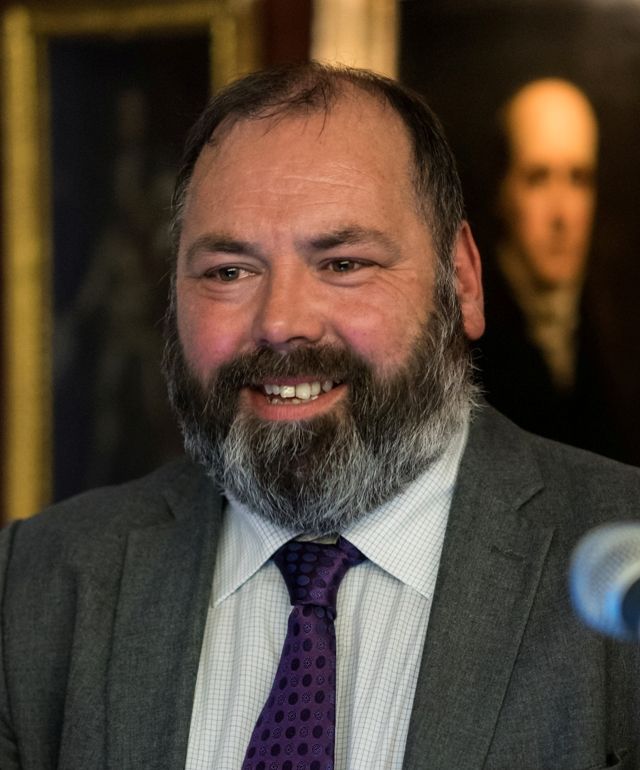2015
Our President in 2015/6 was:
Professor Gerard Carruthers
He proposed the Toast to Sir Walter at our 107th Annual Dinner on 10th March 2016.
Summary of the Speech:
Professor Gerard Carruthers delivered a deeply learned, moving, and frequently humorous Presidential Address focused on Chronicles of the Canongate, situating it within the context of Scott's later life, financial ruin, and continued creative vitality. Carruthers offered a thorough examination of the book’s structure, themes, and characters, and used it as a lens to explore the enduring relevance and moral complexity of Scott's fiction.
Key themes included:
- Scott’s Financial Crisis (1826): After the collapse of Constable and Ballantyne’s businesses, Scott took on full personal responsibility for their collective debts. This context of ruin and loss profoundly influenced Chronicles of the Canongate.
- Crystal Croftangry, Scott’s Alter Ego: The narrator is a retired man who symbolically rejects the upward mobility of the New Town and settles between the moral extremes of Edinburgh's Old and New Towns, finding solace in storytelling.
- Scott’s Philosophy of Human Nature: Carruthers argues that Scott believed human nature remains unchanged even as material progress occurs. The “nevertheless principle” (taken from Muriel Spark) becomes a metaphor for Scott’s realism: that beneath civilisation lies primal humanity.
- Metafictional Framing: The address analysed Scott’s intricate narrative structures—stories within stories, framed by characters like Croftangry and second-hand storytellers—which challenge the reader’s expectations and delay narrative gratification.
- Tragic Realism of the Three Tales:
- The Two Drovers: A tragedy of miscommunication, cultural pride, and legal inevitability.
- The Highland Widow: A story of generational conflict, tragic loyalty, and doomed honour.
- The Surgeon’s Daughter: A critique of colonial ambition and human betrayal, traversing from Scotland to India.
- Moral Complexity & Modernity: Carruthers rejects crude readings that see Scott as ideologically simplistic. Instead, he shows how Scott portrays modern, multilingual, and cosmopolitan Highlanders undone not by “primitive” ways, but by deceit and prejudice from within and without.
- Autobiographical Resonance: Carruthers drew moving parallels between Croftangry’s self-examination and Scott’s own painful period of bereavement and debt, showing how Scott transformed personal crisis into literary greatness.
Notable & Interesting Points
- The “Harlequin” Mask Allegory: Scott compares revealing his identity as the “Author of Waverley” to a Harlequin removing his mask—and losing his creative spark. He resists this fate by continuing to write as “Croftangry.”
- Scott’s Use of Tragedy: All three stories in Chronicles of the Canongate end tragically. This innovation—embracing the “unhappy ending”—places Scott as a pioneer of realist fiction and anticipates later modernist themes.
- Reversal of Stereotypes: In The Two Drovers, it is the Englishman who is proud and hot-headed, and the Highlander who acts thoughtfully—subverting national stereotypes.
- Romance Reimagined: Carruthers reframes Scott's “romance” not as escapism, but as a form filled with “riotous emotion, honour, principle, and moral messiness”—a true portrait of human life.
- Scott as a Universalist: Rather than seeing Scott as a parochial Tory or mere romantic nostalgist, Carruthers presents him as a unionist in the philosophical sense: a believer in human complexity across cultures and time.
- The Power of Storytelling: For Carruthers, Scott’s greatness lies in his moral integrity and commitment to narrative as a means of facing the darkness with dignity.

You may also like:
2015: Prof. Gerard Carruthers - Burns & Scott: Builders of the Scottish Nation [video]
2024:
Prof. Gerry Carruthers - The Edinburgh and Borders of Sir Walter Scott and Muriel Spark [video]
Professor Gerard Carruthers FRSE is Francis Hutcheson Chair of Scottish Literature at the University of Glasgow. He is General Editor of the Oxford Collected Works of Robert Burns and was Founding Director of the Centre for Robert Burns Studies at the University of Glasgow in 2007.
He is the University of Glasgow representative on the Joint Advisory Committee at Abbotsford and with Alison Lumsden edited Scott's Reliquiae Trotcosienses (Edinburgh University Press, 2004).
He holds a visiting professorship of English at UESTC (China), has been Visiting Professor of English at the University of Wyoming, Stuart Visiting Fellow at the University of Otago (New Zealand), W. Ormiston Roy Memorial Visiting Research Fellow at the University of South Carolina, Visiting Research Fellow at All Souls, Oxford, and an external examiner for a range of United Kingdom and overseas universities. He is on the editorial board of six academic journals and has written or edited twenty three books and over one hundred and eighty essays and reviews.
He was born in Stirlingshire, brought up in Clydebank, and prior to taking up a post at the University of Glasgow, was Lecturer in English Studies at the University of Strathclyde (1995-2000) and British Academy Research Fellow at the University of Aberdeen (1993-5) working on the Edinburgh Edition of the Waverley Novels.
He is a Fellow of the Royal Society of Edinburgh, a Fellow of the English Association, an Honorary Fellow of the Association for Scottish Literature and is the first Honorary Fellow of the World Burns Federation.


